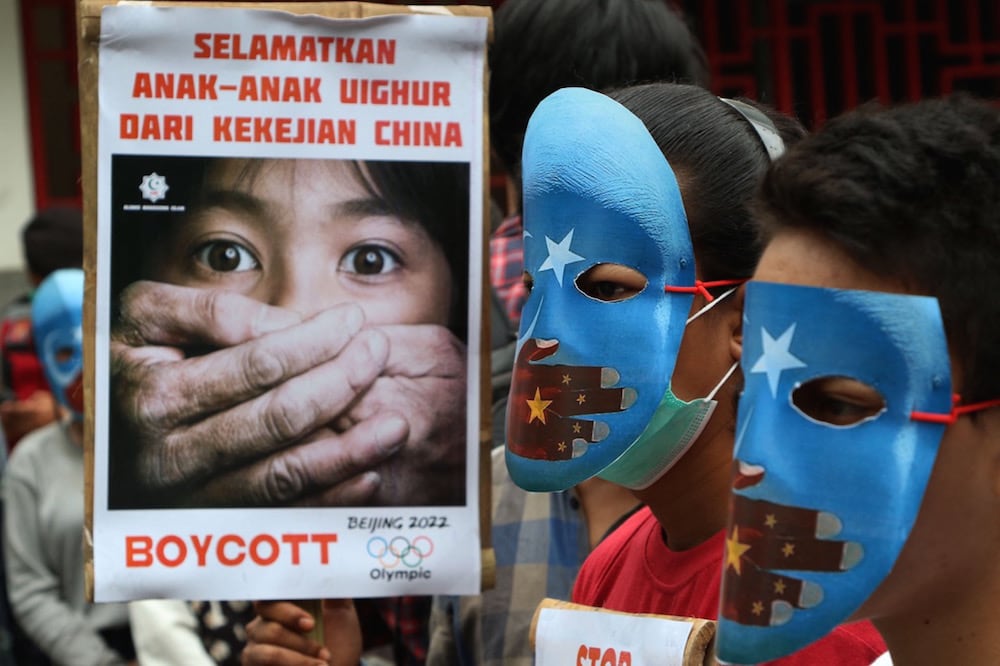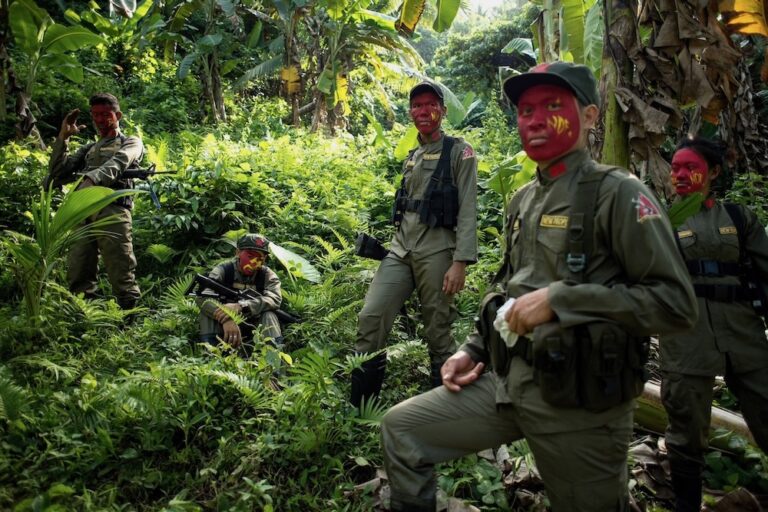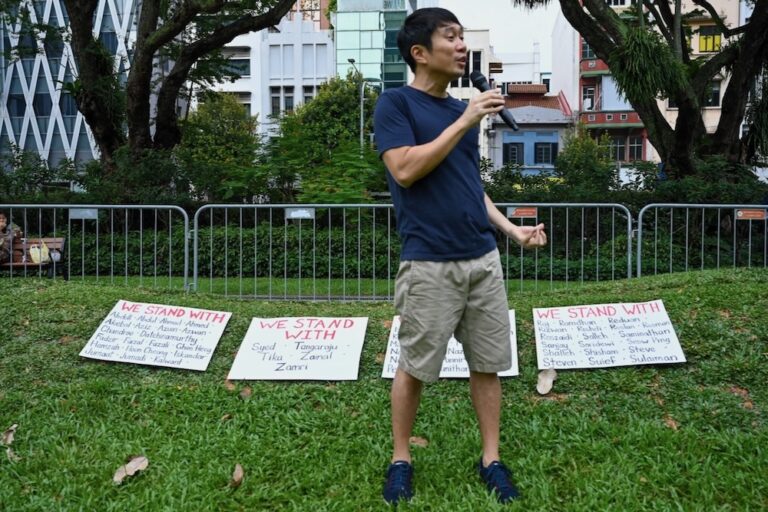January 2022 in Asia-Pacific: A free expression round up produced by IFEX's regional editor Mong Palatino, based on IFEX member reports and news from the region.
Will there be ‘sportswashing” of China’s human rights situation during the Winter Olympics? Myanmar’s crackdown on journalists and dissenters continues ahead of coup anniversary. Pakistan enacts a new law that aims to protect women from workplace harassment.
Winter Olympics and China’s human rights record
China’s human rights situation is under the spotlight as it hosts the 2022 Winter Olympics which begin on 4 February.
Steven Butler, the Asia program coordinator of the Committee to Protect Journalists (CPJ), summed up the concern of media groups ahead of the games: “Can China and the International Olympic Committee maintain a ‘bubble’ of total press freedom inside China’s vast sea of repression?” The “sea of repression” refers to the detention and forced labor of Uyghurs and other Turkic groups in Xinjiang, the dismantling of civic space in Hong Kong, massive surveillance of citizens, and the persecution of journalists and human rights defenders.
Sarah Cook, China Media Bulletin director of Freedom House, warned against information restrictions that Beijing authorities might impose on athletes, journalists, and visitors, including:
- Surveillance of athletes and journalists
- Reprisals for political speech and independent reporting
- Rapid censorship of any scandals, even those unrelated to the Olympics
- Stonewalling foreign journalists
- Repercussions after the closing ceremony
Athletes of several countries are now advised by their governments to take security precautions after a study by Toronto-based internet freedom watchdog Citizen Lab found out that the mandatory health monitoring mobile app My2022 has flaws that could make users vulnerable to surveillance. It also identified 2,000 keywords, including sensitive topics such as Dalai Lama, Xinjiang, Falun Dafa, and Tibet, in an embedded file in the app that could be activated for censorship.
The case of tennis star Peng Shuai, who spoke out against sexual abuse and whose social media presence has been removed, is cited as an example by various groups of how the IOC has done little to hold China accountable to its commitment to uphold human rights.
Over 240 organizations from around the world have urged governments to join a diplomatic boycott of the Games.
“It’s not possible for the Olympic Games to be a ‘force for good,’ as the International Olympic Committee claims, while the host government is committing grave crimes in violation of international law,” said Sophie Richardson, China director at Human Rights Watch.
Myanmar coup anniversary: IFEX calls for international action to end crackdown
A year has passed since the military grabbed power in Myanmar, which immediately led to the curtailing of rights and the silencing of independent media. The junta quickly resorted to violence after pro-democracy forces rallied citizens to call for the restoration of civilian rule. Around 1,500 people were killed by security forces and almost 12,000 arrested over the past year. After the release of three journalists this month, 46 journalists remain in detention.
Since December, three journalists have been killed in the course of their work. A photojournalist who covered the ‘silent strike’ on Human Rights Day died in police custody on 14 December, the editor of Federal News Journal was killed in an artillery attack on 25 December, and the editor of Khonumthung Media Group was abducted and used as a human shield by soldiers on 8 January this year. The dead body of Pu Tuidim, who is also one of the founders of Burma News International, was found the following day.
Reporters Without Borders (RSF) condemns the spate of media killings. “Cruelty, cynicism, barbarity – these words seem inadequate to describe Pu Tuidim’s shocking murder. He is the third journalist to be killed in Myanmar in less than a month, in a sign of the absolutely unacceptable practices increasingly employed by the junta.”
IFEX is demanding urgent international action to end the crackdown in Myanmar.
“That’s why today we’re amplifying our call for action. The UN, ASEAN and their individual member states must pressure Myanmar’s junta to end its crackdown on civil society, free protestors and journalists, and restore media licences. Journalism is not a crime, and the entire IFEX network stands behind Mizzima News and the many other courageous media outlets and journalists working to publish the truth about the regime’s actions,” said IFEX Executive Director Annie Game.
Focus on gender
Muslim women in India “auctioned off”. A malicious app appeared in India which made available 100 photos stolen from the social media accounts of Muslim women. The app was immediately taken down, but it illustrates the harassment faced by Muslim women in society. The Print website editor Fatima Khan, who was also “advertised” in the app, told RSF how the operation targeted Muslim women and journalists.
“The common thread among all the targets is that these are all vocal Muslim women who aren’t afraid of expressing themselves. The idea is to humiliate them and send the message that they don’t belong in public life.”
Pakistan’s new law offers women protection from workplace harassment. Women’s groups are celebrating the enactment of the Protection against Harassment of Women at the Workplace (Amendment) Act, 2022 which strengthens provisions aimed at addressing harassment against women in the workplace. Digital Rights Foundation (DRF) Executive Director Nighat Dad posted a Twitter thread highlighting the significant parts of the new law.
She notes how the amendments will make it easier for women to file complaints against their abusers. “These amendments are colossal as harassment which enables a hostile environment needs no longer be repetitive, sexual and overt. Even a single incident of gender harassment which makes a person uncomfortable creates a ‘hostile environment’ and is enough to file a complaint.”
In brief
In Thailand, civil society groups have sent a letter to the government of Thailand expressing concerns regarding the Draft Act on the Operations of Not-for Profit Organizations B.E… (‘Draft Act’) , for containing provisions that could potentially curtail the rights to freedom of expression, association, peaceful assembly and other human rights.
In India-administered Kashmir, journalists deplored the continuing attacks on media freedom. The latest incident involved a raid on the Kashmir Press Club, normally a safe haven for independent reporters. Police officers escorted out a group of individuals who identified themselves as the new officers of the club, before shutting down the office – supposedly to enforce COVID-19 protocols. Later, the local government revoked the club’s license.
In South Korea, around 120 journalists suspect their phone records were accessed by the Corruption Investigation Office for High-Ranking Officials in an attempt to discover their sources. The International Press Institute (IPI) said, “Such actions clearly undermine the right of journalists to protect the identities of their sources, including whistleblowers, and to operate free from state surveillance.”
In Malaysia, the Centre for Independent Journalism (CIJ-Malaysia) and Gerakan Media Merdeka, have criticized the Malaysian Anti-Corruption Commission chief commissioner for harassing investigative journalist Lathiha Kunaratnamm, who published a report about alleged corruption involving the official. Media groups are urging greater protection for journalists and whistleblowers.
In Indonesia, the Alliance of Independent Journalists (AJI) has released its annual report on the state of media freedom. It documented 43 cases of violence against journalists throughout 2021.
And finally, in Vietnam, a court in Hanoi sentenced journalist Le Trong Hung to five years in prison and five years probation for publishing “anti-state propaganda”. Hung is a reporter for independent online news outlet Chen Hung Nuoc Viet and a former National Assembly candidate. Human Rights group The 88 Project also reported that eight persons have been arrested for the similar charge of publishing ‘anti-state propaganda’ during the first two weeks of the new year.



